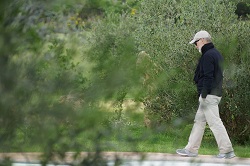A Writer Writes: Apocalypse Then, Part I
Apocalypse Then
by Bob Criso (Nigeria & Somalia 1966–68)
•
Part I
Ishiagu: July, 1967
EAGER FOR NEWS OF THE WAR, I huddled with my students many evenings around a transistor radio and a kerosene lamp listening to Radio Enugu. Refugees were returning from the North with stories of Igbos being hacked into pieces, pregnant women being cut open and children screaming inside burning homes. There was a report on the radio about a train filled with bloody body parts that were sent down from the North “as a warning.” I was skeptical about that one until I saw a woman returning to the village carrying the head of a man. She said she had retrieved it from the train.

Several weeks earlier, Ruth Olsen, the Nigeria Peace Corps Director in the East, had given me a van as part of an emergency evacuation plan. I was supposed to pick up several PCVs in the area if I received word from the Peace Corps office to evacuate. (Many PCVs in the East had already left by this time when they were given the choice.) I felt safe in friendly and remote Ishiagu, but I didn’t realize how cut-off I was from what was going on nearby. Reality hit when two jeeps of Biafran soldiers pulled up in front of my classroom one morning and ordered the principal to shut down the school. They said it would be used for Biafran army barracks. The students left, the teachers left and I went home anxious and uncertain about what to do.
With no word yet from Ruth Olson, the next day I decided to check in with two PCVs who lived about an hour away. When I left the red clay road in front of my house and hit the paved road, I entered what felt like a twilight zone. All signs identifying any building or giving directions anywhere had been taken down. The road was a series of roadblocks with cut-down trees blocking passage. Local vigilantes wielding machetes and wooden clubs manned them. I was stopped, searched, scrutinized and interrogated. All of a sudden, anyone who didn’t know me suspected me of being a spy or a mercenary.
“Where are you going?”
“What is your business there?”
“Search the van!”
“What is this map for?”
“Empty your pockets!”
“How do we know he isn’t lying?”
My limited Igbo and knowledge of the area became an invaluable asset. I made it to Laura and Jeff’s school (not their real names) but didn’t go any further. The roads were too dangerous and unfamiliar to risk it. We drove back to Ishiagu to wait for word from the Peace Corps, though not without further intimidation and humiliation, especially for Laura.
Not long after reaching my house, a crowd began to gather around it. Two men then came to the front door. Felix, my houseboy, spoke to them. Felix told me the men wanted to know who the strangers were. When I explained that they were also PCVs, the men weren’t satisfied. Felix was trembling when he said the men now wanted to search the house. I remember thinking if I let them cross that boundary, what would be next?
“Tell them No,” I said to Felix. The men stormed out and returned to the crowd. Laura, Jeff and I watched from a window while two men rolled a rusted blue fifty gallon drum of kerosene under my house.
(To be continued)
•
Bob Criso lives in New York City. Bob worked at the Counseling and Psychological Services at Princeton University for years, and also had a private practice in Princeton. Currently he is writing a memoir. He also doing some theater and movie reviews, and still travels. This week he leaves for Israel for a month of touring. (bobcriso@gmail.com)
Can someone explain what the Peace Corps was thinking by leaving PCVs in-country under these conditions? My volunteer tour ended in December 1965 — the month before the first coup that brought Aguiyi-Ironsi to power. It boggles the mind that the Peace Corps was still operating in Nigeria a year and a half later and it’s a miracle that no PCVs were killed — although they were witnesses to heinous deeds and very much at risk of becoming direct victims themselves.